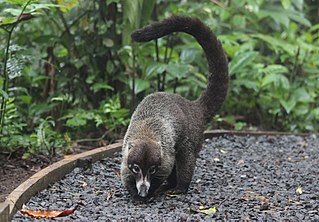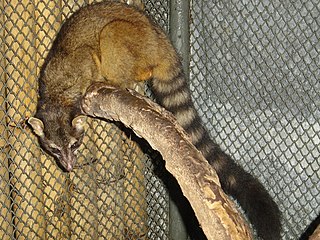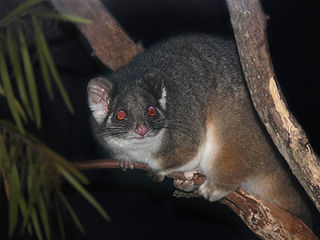| Look up ringtail in Wiktionary, the free dictionary. |
Ringtail, ring tail, or ring-tail may refer to:
| Look up ringtail in Wiktionary, the free dictionary. |
Ringtail, ring tail, or ring-tail may refer to:

Phalangeriformes is a paraphyletic suborder of about 70 species of small to medium-sized arboreal marsupials native to Australia, New Guinea, and Sulawesi. The species are commonly known as possums, gliders, and cuscus. The common name "possum" for various Phalangeriformes species derives from the creatures' resemblance to the opossums of the Americas. However, although opossums are also marsupials, Australasian possums are more closely related to other Australasian marsupials such as kangaroos.

The white-nosed coati, also known as the coatimundi, is a species of coati and a member of the family Procyonidae. Local Spanish names for the species include pizote, antoon, and tejón, depending upon the region. It weighs about 4–6 kg (8.8–13.2 lb). However, males are much larger than females: small females can weigh as little as 2.5 kg (5.5 lb), while large males can weigh as much as 12.2 kg (27 lb). On average, the nose-to-tail length of the species is about 110 cm (3.6 ft) with about half of that being the tail length.

Coatis, also known as coatimundis, are members of the family Procyonidae in the genera Nasua and Nasuella. They are diurnal mammals native to South America, Central America, Mexico, and the southwestern United States. The name coatimundi purportedly derives from the Tupian languages of Brazil.

The ringtail is a mammal of the raccoon family native to arid regions of North America. It is widely distributed and well adapted to disturbed areas. It has been legally trapped for its fur. It is listed as Least Concern on the IUCN Red List. It is also known as the ringtail cat, ring-tailed cat, miner's cat or bassarisk, and is sometimes called a cacomistle, though this term seems to be more often used to refer to Bassariscus sumichrasti.

Procyonidae is a New World family of the order Carnivora. It comprises the raccoons, ringtails, cacomistles, coatis, kinkajous, olingos, and olinguitos. Procyonids inhabit a wide range of environments and are generally omnivorous.

The kinkajou is a tropical rainforest mammal of the family Procyonidae related to olingos, coatis, raccoons, and the ringtail and cacomistle. It is the only member of the genus Potos and is also known as the "honey bear". Kinkajous are arboreal, a lifestyle they evolved independently; they are not closely related to any other tree-dwelling mammal group.

The cacomistle is a nocturnal, arboreal and omnivorous member of the carnivoran family Procyonidae. Its preferred habitats are wet, tropical, evergreen woodlands and mountain forests, though seasonally it will venture into drier deciduous forests.

The common ringtail possum is an Australian marsupial. It lives in a variety of habitats and eats a variety of leaves of both native and introduced plants, as well as flowers, fruits and sap. This possum also consumes a special type of faeces that is produced during the daytime when it is resting in a nest. This behaviour is called caecotrophy and is similar to that seen in rabbits.
Cecotropes, also caecal pellets, or night fecs, are the product of the cecum, a part of the digestive system in mammals of the order lagomorpha, which includes two families: Leporidae, and Ochotonidae (pikas). Cecotropes are passed through the intestines and subsequently reingested for added nutrients in a process known as "cecotrophy", "cecophagy", "pseudorumination", "refection", coprophagia or "coprophagy". Reingestion is also practiced by a few species of rodent, some marsupials and one species of primate.

Pseudocheiridae is a family of arboreal marsupials containing 17 extant species of ringtailed possums and close relatives. They are found in forested areas and shrublands throughout Australia and New Guinea.

Pseudocheirus is a genus of ringtail possums. It includes a single living species, the common ringtail possum of Australia, as well as the fossil Pseudocheirus marshalli from the Pliocene of Victoria.
Possum may refer to:
Slender ringtail possum or Small ringtail possum (Pseudochirulus), also known as the ringtail possum, is a genus of marsupial in the family Pseudocheiridae native to Indonesia, Papua New Guinea and Queensland, Australia. Pseudochirulus live on trees and their diet mainly consists of leaves. The ringtail possums are related to five other genera Hemibelideus, Petauroides, Petropseudes, Pseudocheirus and Pseudochirops.

The western ringtail possum or ngwayir refers to a species of possum, Pseudocheirus occidentalis, found in a small area of Southwest Australia. They are a cat-sized marsupial with a stocky build, dark greyish-brown fur, pale underparts and a long prehensile tail with a whitish tip. Ngwayir forage at night through the upper canopy of trees, feeding on young leaves, flowers and fruit, especially in groves of the weeping peppermint Agonis flexuosa. Breeding occurs mainly during the winter, the single juvenile emerging from the pouch after about three months. The population has declined by more than 95% since British settlement, due to clearing of habitat, fire and the introduction of the red fox Vulpes vulpes, and is classified as Critically Endangered. The population in most areas has catastrophically declined or become locally extinct, but strongholds remain in the urbanised areas near Busselton and Albany.

Petauroidea is a superfamily of marsupials from Australia and New Guinea. It is part of the suborder Phalangeriformes within the order Diprotodontia, which also includes, among others, wombats, kangaroos, cuscuses. The superfamily Phalangeroidea, including cuscuses and brushtail possums and pygmy possums, is the immediate sister group of the Petauroidea.
A lemur is a Malagasy primate.